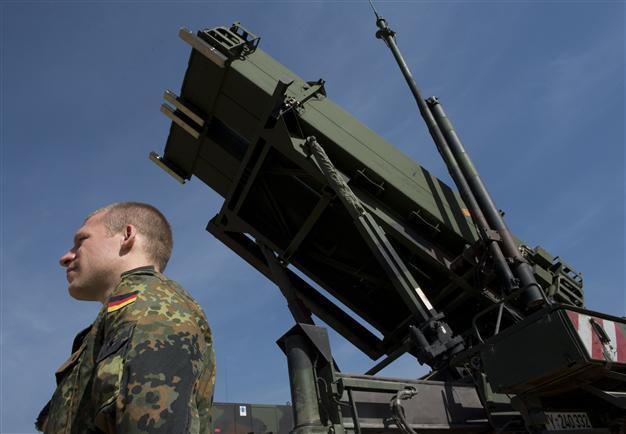US, Germany to pull Patriot missiles from Turkey
ANKARA / BERLIN

AFP photo
The United States announced on Aug. 16 that it had informed the Turkish government that the U.S. deployment of Patriot air and missile defense units in Turkey, which expires in October, will not be renewed. The announcement came one day after Germany also said it would pull its Patriot missile batteries from southern Turkey.“The Patriots will be redeployed to the United States for critical modernization upgrades that will ensure the U.S. missile defense force remains capable of countering evolving global threats and protecting Allies and partners – including Turkey,” read a joint statement issued by the Turkish and U.S. governments.
“The United States and NATO are committed to supporting Turkey’s security and regional stability,” it added. “As the United States deploys additional air assets and partners with Turkey to counter [Islamic State of Iraq and the Levant] ISIL, the United States will also continue to work closely with Turkey on how to support Turkey’s air defense capabilities, including against ballistic missile risks and threats.”
The statement added that the U.S was ready to return Patriot assets within one week, if required.
"The United States will maintain in-theater capability to rapidly transport and support emergent Ballistic Missile Defense (BMD) requirements, and is prepared to sustain the current deployment site in a cold-basing status to facilitate future deployments of U.S. Patriots. If needed, the United States is prepared to return Patriot assets and personnel to Turkey within one week." it read.
The statement noted that the U.S. Navy’s Aegis ships will remain in the eastern Mediterranean.
“These ships offer a range of capabilities to support the defense of Turkey and NATO missions, including support for NATO air and missile defense. U.S. Naval Forces in Europe will continue their close cooperation with the Turkish Navy in the region in support of Turkish defense needs,” the statement read.
It also stressed that the joint effort of two countries was aimed at "[reinforcing] Turkey's security."
The announcement of the ending of the U.S. missile mission followed a similar decision by Germany.
German Defense Minister Ursula von der Leyen announced on Aug. 15 that Berlin would let its three-year Patriot mission lapse in January, instead of seeking parliamentary approval to extend it.
Germany, the United States and the Netherlands all deployed Patriots in early 2013 after Turkey asked its fellow NATO partners for help in protecting its territory amid an escalating civil war in Syria. The Dutch ended their mission earlier this year and were replaced by the Spanish.
“The threat in this war-torn region has shifted in focus,” von der Leyen said in a statement on the German Defense Ministry’s website. “It now stems from the terror organization Islamic State. Therefore, we will remain engaged in the region in a continued effort to stabilize it.”
The decision follows criticism from some German officials of Turkey’s military crackdown against the outlawed Kurdistan Workers Party (PKK) and President Recep Tayyip Erdoğan’s recent announcement that the peace process launched in 2012 was effectively at an end.
“The Erdoğan government has invested a great deal in reconciliation with the Kurds,” German Foreign Minister Frank-Walter Steinmeier said in an interview with the Bild am Sonntag newspaper. “It can’t allow all the bridges that have been built up over the course of this process to be torn down.”
At the same time, Steinmeier warned against judging Turkey too quickly, noting that it was taking on more refugees from Syria and Iraq than any other country and coping with a major threat on its border from the civil war in Syria.
















